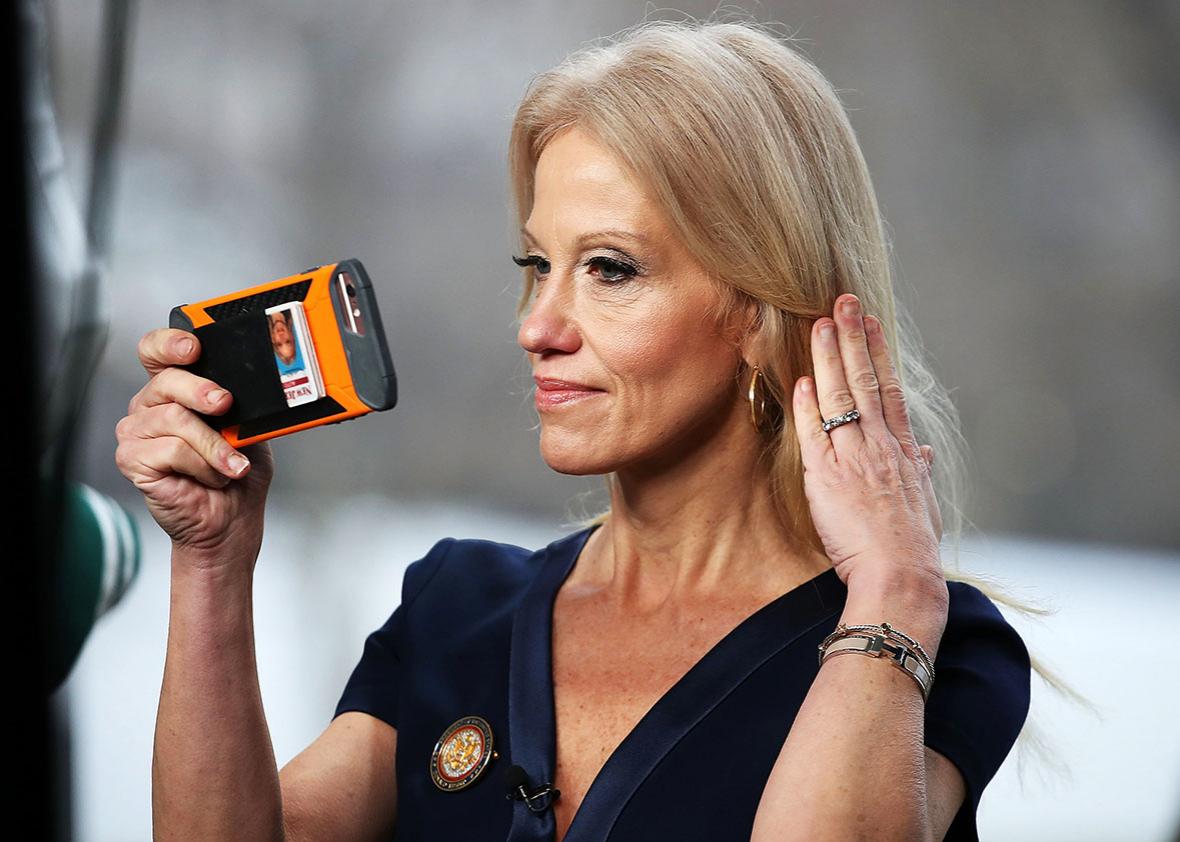This past Sunday on Meet the Press, Chuck Todd spent 13 minutes trying to get Trump spokeswoman Kellyanne Conway to explain “why President Trump [sent] out his press secretary to essentially litigate a provable falsehood” about Trump’s inauguration. The falsehood, delivered by Press Secretary Sean Spicer on Saturday, was that Trump had attracted “the largest audience to witness an inauguration, period.” Spicer had also dismissed photos of the crowd, claiming they “were intentionally framed” to make it look small.
Conway dodged the question. Todd repeated it. Around and around they went. Todd grew exasperated. “It undermines the credibility of the entire White House press office,” he sputtered. Conway played the victim. “Don’t be so overly dramatic about it, Chuck,” she chided. “You’re supposed to be a news person,” she told him.
This is what happens when TV journalists treat Conway like a normal Washington flack. We’ve seen it in interview after interview. She disregards evidence and the rules of rational conversation. She says the crowd was bigger than it looked, and it would have been bigger if not for the rain, and millions watched it on TV, and millions more watched it online (we have no way to measure that, but so what), and you can’t really estimate crowd size anyway, and crowd size doesn’t matter. She turns on a dime. One minute, she’s characterizing the contents of an intelligence briefing. The next, she’s insisting that Trump, unlike his critics, would never talk about such briefings because he’s “protecting our children, Chuck, by not leaking.”
An interview with Conway is like a game of Crazy Eights with one rule change: Every card is crazy. No matter what you say, she’ll pick a word from your question and use it to change suits. Use the word “fact,” and she’ll ask, “Chuck, do you think it’s a fact or not that millions of people have lost their plans or health insurance?”
Ask her about Russian interference in the election and she’ll reply, as in this interview with George Stephanopoulos on ABC: “A lot of people in the mainstream media interfered with our election by trying to help Hillary Clinton win.” Ask her about the intelligence on the Russian hack—“You don’t believe the intercepts?” asked CNN’s Chris Cuomo—and she’ll say, “Here’s what I don’t believe … that [this issue is] so darn important to you now.”
Tell her there’s “no evidence that there were millions of illegal votes,” (Stephanopoulos again) and she’ll fire back, “There’s also no evidence that a recount is going to change the results in Wisconsin, Michigan, and Pennsylvania.” You’ll never win this game because you’ll have to use words. She’ll pick the one she likes and throw out the rest.
This drives journalists nuts. They feel a duty to rebut lies, and in the age of “John Oliver Destroys Something” headlines, there’s an appetite among liberal viewers for plucky correspondents eviscerating right-wing ideologues on-air. We’ve now seen one host after another—Todd, Cuomo, Anderson Cooper—lose his cool or waste a long interview trying to make Conway acknowledge elementary facts.
Of course, presidential flacks have always tried to stretch or shade the truth during on-air interviews. In his first briefings as press secretary to President George W. Bush, Ari Fleischer juggled contrary rationales for tax cuts, that the government could afford them or that a weak economy needed them, using whichever argument seemed to fit the evidence presented. In his first briefings as press secretary to President Obama, Robert Gibbs used the term “financial stability package” to mask the stench of corporate bailouts. Reporters understood that no matter what they asked, Fleischer would defend tax cuts and Gibbs would defend bailouts. But the president’s spokesman would generally try to reconcile the president’s agenda with the facts. And if he couldn’t, he would at least clarify the agenda.
Conway brings none of that. She alters unwelcome questions, disregards the facts presented to her, and clarifies nothing. In part, that’s because Trump has no organized agenda. All he has is ego. So that’s what she fights for. She’s not there to persuade a skittish Republican senator to repeal the Affordable Care Act. She’s there to defend and avenge one man’s wounded pride.
It’s a waste of time to ask Conway about Trump’s strategy or to challenge her about right and wrong. She’ll just leave your head spinning. Instead, interviewers should stick to simple factual queries: “Do you have proof that this was the largest audience to witness an inauguration?” “Do you dispute that these two photos were taken at the same time of day?” “Doesn’t the date on the press release show that this investment was announced before the election?” “Do you have an Obamacare replacement plan that you can share with us today?” Any answer besides “yes” or “no” should probably be met with “Let’s move on.” There’s no point in getting apoplectic at Conway. She’s never going to break. If you think the only way to beat these people is to make them admit their lies, you’re the one who will lose.
